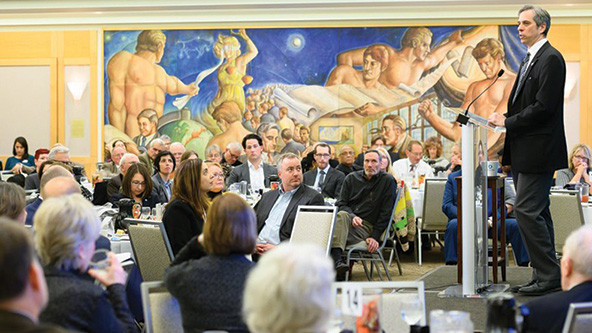 Rebuild Local News president Steve Waldman (R) delivers a keynote address on the future of journalism at The City Club of Cleveland’s annual meeting on November 1, 2019. (Photo courtesy of The City Club of Cleveland)
Rebuild Local News president Steve Waldman (R) delivers a keynote address on the future of journalism at The City Club of Cleveland’s annual meeting on November 1, 2019. (Photo courtesy of The City Club of Cleveland)
The catastrophic collapse of local news is a global phenomenon. Governments and civil society around the world are considering how public policy can save local news in order to stem the growing tide of political manipulation and disinformation.
In the United States, the problem is compounded by a national culture that is reluctant to mix government and the press and by extreme political polarization that has eroded trust in both institutions.
Rebuild Local News, a nonpartisan nonprofit coalition, launched in 2020 to confront these challenges. The public-policy initiative started as a part of Report for America, a news nonprofit that recruits emerging journalists and matches them with newsrooms committed to strengthening local news, and its fiscal sponsor, the GroundTruth Project. Report for America subsidizes the compensation of those reporters and helps newsrooms raise money from their communities.
“The severity—and the speed—of the collapse of local news is so immense, and the threat to communities and democracy is so severe, that we need a multipronged approach to solving it,” warns Rebuild Local News president Steven Waldman. “There’s been an 82 percent drop in the amount of advertising revenue for newspapers in about a two-decade period and an almost 60 percent drop in the number of journalists.”
Report for America envisioned Rebuild Local News as focusing on public-policy solutions like tax credits and subsidies to address the rapidly accelerating disappearance of local-news outlets. But what started off as a public-policy-focused coalition continued growing to the point where Report for America decided, in 2023, to establish it as an independent nonprofit. According to Waldman, the change was made to give Rebuild Local News its own mission and funding so that it wasn’t merely a side project of Report for America—which he cofounded—and to protect the mission of that organization and the GroundTruth Project.
“With Rebuild Local News, we are [entering] into the world of advocacy, and there’s some value in separating that from the journalistic operation that is Report for America,” Waldman says. “It’s good for both entities to have their own personality.”
Originally, several major philanthropies—including the Knight Foundation, the Ford Foundation, the MacArthur Foundation, and the American Journalism Project—backed the initiative through GroundTruth and Report for America. Some of these funding sources transferred to Rebuild Local News when it became a nonprofit.
Waldman thinks that serious attempts to reverse the local-news crisis must incorporate philanthropy, business, and public policy.
“There needs to be new ownership structures for commercial news organizations, for instance,” he says. “But philanthropy and commercial innovation will not be enough. We also need public policy and, in some cases, taxpayer support.”
What distinguishes Rebuild from other organizations seeking to revitalize the local-news business is “its laser focus on actionable public-policy solutions—big ideas to address a big, big problem,” says Jim Friedlich, CEO of the Philadelphia-based Lenfest Institute for Journalism and a board member of Rebuild Local News. “The legislative and policy solutions proposed have been simple, smart, nonpartisan, and First Amendment friendly.”
Nevertheless, Rebuild Local News is not naive about the potential downside of mixing politics and journalism. Waldman acknowledges the many examples—especially under authoritarian leadership—of government funding being weaponized to promote populist agendas.
But Waldman remains guardedly optimistic about Rebuild Local News. In 2022, the ideologically split US Congress, he notes, came “very close” to passing the Local Journalism Sustainability Act, which included a payroll-tax credit for news organizations that hire or retain local reporters. The legislation, narrowly defeated, would have provided $1.7 billion for local news over five years.
Looking to the near future, Waldman says the coalition will continue the fight to pass legislation at the federal level.
“We’re trying to develop a broader coalition and really create a strong foundation to get the federal bill passed,” he says. “As for the state governments—in red, purple, and blue states alike—they need to really understand the severity of the crisis. And move quickly.”
Support SSIR’s coverage of cross-sector solutions to global challenges.
Help us further the reach of innovative ideas. Donate today.
Read more stories by Gustavo Turner.

